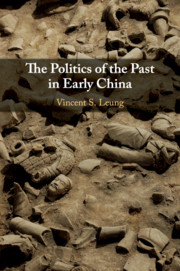
- Cited by 6
-
Cited byCrossref Citations
This Book has been cited by the following publications. This list is generated based on data provided by Crossref.
Campbell, Roderick B. 2020. Beyond meaning: skeuomorphy and the mediation of Shang things. World Archaeology, Vol. 52, Issue. 3, p. 376.
Liu, Yibing Sun, Caixia Tao, Li and Lee, John Chi-Kin 2021. Envisioning Teaching and Learning of Teachers for Excellence and Equity in Education. p. 87.
Yin, Peng 2021. VIRTUE AND HIERARCHY IN EARLY CONFUCIAN ETHICS. Journal of Religious Ethics, Vol. 49, Issue. 4, p. 793.
Isay, Gad C 2022. Non-forgetfulness and forgetfulness 忘 (wang) in ancient Chinese philosophical texts. Memory Studies, Vol. 15, Issue. 2, p. 465.
Russell, Amy 2024. Place and Performance in Ancient Greece, Rome, and China. p. 19.
Blahuta, Jason P. 2024. Dao Companion to China’s fa Tradition. Vol. 19, Issue. , p. 595.
- Publisher:
- Cambridge University Press
- Online publication date:
- July 2019
- Print publication year:
- 2019
- Online ISBN:
- 9781108348843


